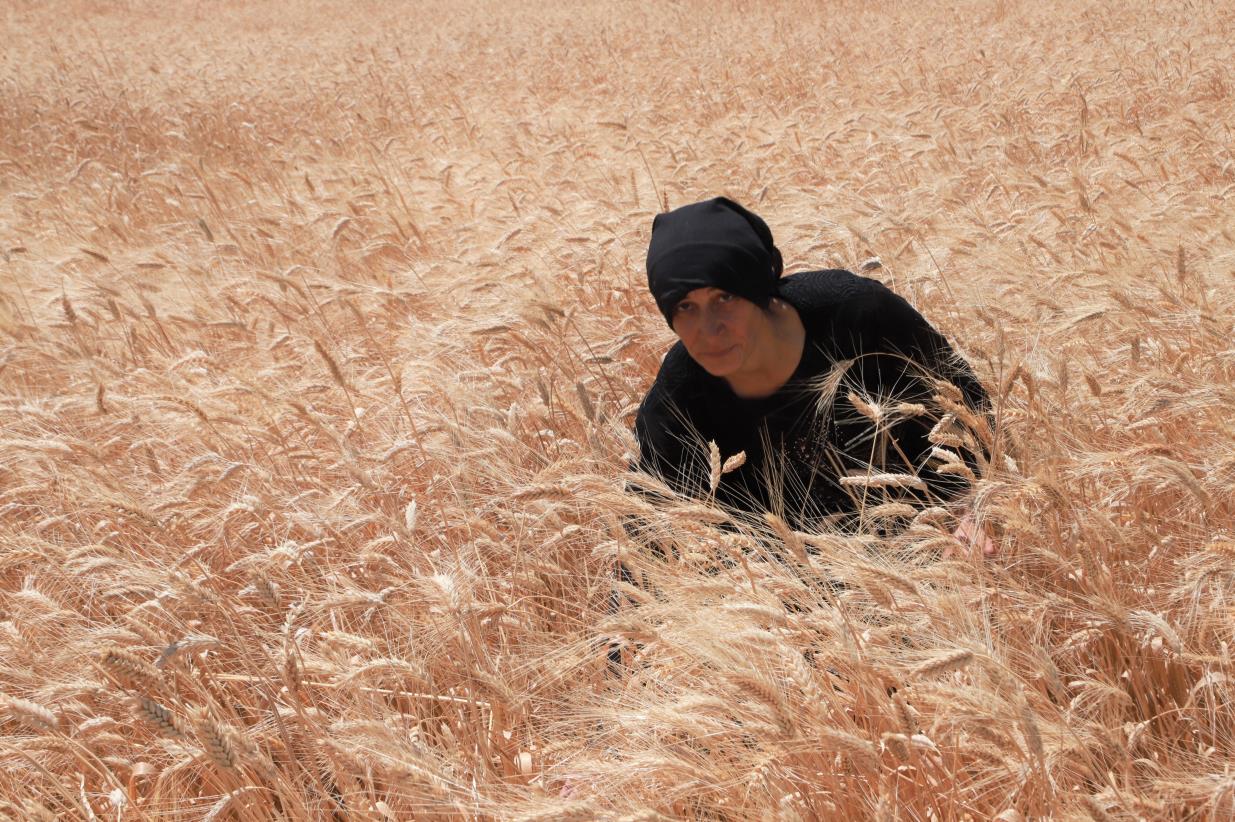Returnee farmers on track to harvest more than 11,000 tons of good quality wheat

Majd Al Mahmoud in a wheat field in Syria. ©FAO/Syria
Damascus, 23 June 2020 - “Here we are today, back to planting and harvesting quality wheat two years after fleeing home. We are excited since agriculture is our only source of living,” said Majd Al Mahmoud from Al Sefsafeh Village - Hama Governorate.
Majd is one of 5 500 most vulnerable farmers, in Daraa and Hama governorates, who were reached by FAO Syria, with the support of Kuwait, through providing improved wheat seed back in November-December 2019. The supported farmers had been displaced due to fighting; or in a number of cases had lost their crops and future seeds due to wildfires. This year’s harvest has produced more than 11 000 tons of grain, enough to meet food needs for more than 60 000 people in the two governorates. This positive result was affected by providing farmers with improved seed varieties, adapted to local conditions, for the best possible yield.
“It is encouraging to see farmers harvest again after years out of farming due to circumstances beyond their control,” said Mike Robson, FAO Representative in the Syrian Arab Republic.
“This wheat harvest is the fruit of FAO’s partnership with Kuwait. The farmers, especially women headed-households, are recovering their livelihoods and enhancing their food security, increasing their resilience and their ability to respond to future shocks,” he added.
Restoring farmers’ livelihoods after barren years
The improved security situation from September 2019 allowed a large number of farmers to return to their lands to resume their activities. Yet, they lacked access to agriculture inputs and needed to find good quality seed if they were to go ahead with cultivation.
FAO and Kuwait have collaborated to improve the most vulnerable farmers’ living situation by providing improved wheat seed, each farmer received 200 kg seed, enough to plant a one-hectare plot of land.
Today, farmers are working hand in hand to harvest more than 11 000 tons of wheat. Majd Al Mahmoud, a female farmer and the only breadwinner for her young children, has worked with her sister-in-law to harvest their 3.5 tons of quality grain.
“With this quality wheat, I am confident of making a good income to support my children. Now I am sure I can support my 18-year-old daughter who is in high school now; I am determined that she should continue educational path,” said Majd.
FAO and Kuwait working toward Reducing Hunger in Syria and the Region
In August 2019, Kuwait and FAO announced their collaboration to help Syrian farmers and herders improve their living situation by boosting their food and nutrition security. With a generous contribution from Kuwait of $3 million, FAO aims to assist 18 000 highly vulnerable people and their extended families in Syria through the provision of quality agricultural inputs, such as cereal and vegetable seeds, irrigation kits and feed for their animals, combined with training on good agricultural practices.
So far, FAO has reached 8,500 farming families in Daraa, As-Sweida and Hama governorates with wheat and seasonal vegetable seed, farmers will harvest tomatoes, eggplants and cucumber by mid-July. Rehabilitating of two fodder nurseries, will benefit about 10 000 small-scale livestock herders and contribute to feed availability for their animals in Al Badia in Hama and Deir Ez-Zor governorates. The intervention will also help to restore natural grazing areas in these locations.
The broader partnership between FAO and Kuwait has ambitions to fight hunger and malnutrition, and come to the aid of disaster-stricken communities across the Near East and North Africa (NENA) region and beyond, in countries such as Nigeria, Somalia, South Sudan, Syria and Yemen.
